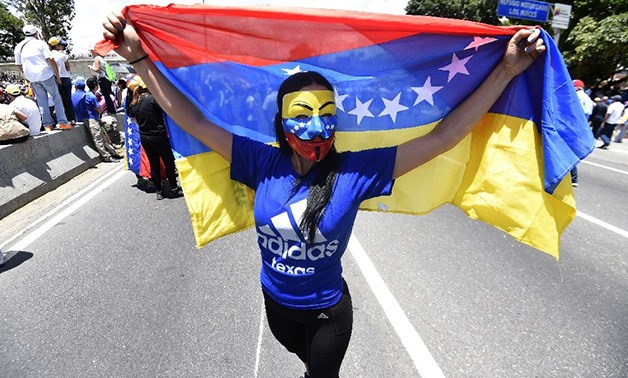
Opposition activists rally on Francisco Fajardo main motorway in eastern Caracas to protest against President Nicolas Maduro - AFP/Juan Barreto
CARACAS - 21 May 2017: Police fired tear gas Saturday at thousands of angry protesters marching in Venezuela's capital in the latest show of defiance against unpopular President Nicolas Maduro.
On the 50th straight day of street rallies against Maduro, protesters also erected barricades of tree branches and stones along the highway where an estimated 10,000 people trudged toward the Interior Ministry in the city center.
In the western city of San Cristobal in Tachira state, an estimated 40,000-plus took to the streets. Maduro this week ordered 2,600 soldiers to Tachira to quell street violence and looting.
In Caracas, demonstrators carried signs that read "#We are millions against the dictatorship" and "#No more dictatorship!"
Protesters blame the socialist Maduro for oil-rich Venezuela's acute economic crisis, marked by shortages of food, medicine and such basics as soap and even toilet paper, and say he is maneuvering to dodge calls for early elections.
"It's been 50 days of protests. I'm here with my two children, I can't get any milk, I can't get any food," said Mariangel, a 24-year-old businesswoman.
The red, blue and yellow colors of the Venezuelan flag were painted on her face.
Also present were young men carrying makeshift shields of wood and metal and wearing hoods and gas masks.
"This has been a massacre against the people," opposition leader Henrique Capriles said before the march got underway.
"Still, the more repression there is, the more we will resist and fight for Venezuela," said Capriles, one of whose lawyers delivered a report on the Venezuelan crisis Friday to the United Nations High Commissioner for Human Rights after Venezuelan officials "canceled" his passport, preventing him from flying to New York.
Maduro's opponents expressed confidence that the march on Caracas's main motorway would surpass that of April 19, the largest so far in seven weeks of demonstrations that have left 47 people dead, hundreds injured, 2,200 detained and some 161 imprisoned by military tribunals.
But so far, Saturday's turnout is nowhere near the hundreds of thousands that marched April 19.
On the other side of town, an estimated 2,000 pro-government workers sang and danced as they staged a rival march to show their support for the president's controversial plan to elect a constitutional assembly to rewrite the constitution. Maduro was set to welcome the workers at the Miraflores presidential palace.
Several hundred people rallied in Miami, too, in a show of support for the anti-Maduro movement in Venezuela. Most were Venezuelan or Cuban.
Venezuela is bitterly divided, as locals bridle under all the shortages, soaring inflation -- prices could rise by 720 percent this year, the IMF estimates -- and some of the world's highest crime rates.
As protests have turned violent, an increasing number of gunshot wounds have been reported. Federal prosecutors said they are investigating the role of police and military personnel in the incidents.
Some of the shootings took place in Tachira state, near the border with Colombia, where Maduro this week deployed 2,600 soldiers after riots and looting.
Protests have swelled since Maduro called for convening a "popular" assembly to re-write the Venezuelan constitution, with half its members coming from sectors loyal to him.
The opposition says the assembly would allow Maduro to avoid elections. He denies this and has "guaranteed" that presidential elections will be held next year, as required by law.
Maduro insisted Friday that the "popular" assembly would provide a "path to peace, dialogue and consensus," while the opposition, he said, was offering only "violence and death."
Analysts say the opposition's biggest challenge will be to keep their marches peaceful.
Protests succeed only when they are massive and persistent, said Luis Vicente Leon, who heads the Datanalisis polling firm. He warned that when demonstrations turn violent, they "lose impact."
Seven in 10 Venezuelans reject Maduro's leadership, according to private surveys, amid widespread economic devastation aggravated by the drop in the prices of oil -- Venezuela's chief revenue source -- in 2014.
That has left Maduro heavily dependent on military support.
Opposition protests grew after the country's Supreme Court on March 30 assumed some of the functions of the National Assembly.
In Washington, Organization of American States (OAS) head Luis Almagro said that the only way to solve the Venezuelan crisis is for the country to immediately hold general elections.
It is time for "definitive negotiations to agree on terms to reestablish democracy" in Venezuela, Almagro said in a video message.


Comments
Leave a Comment